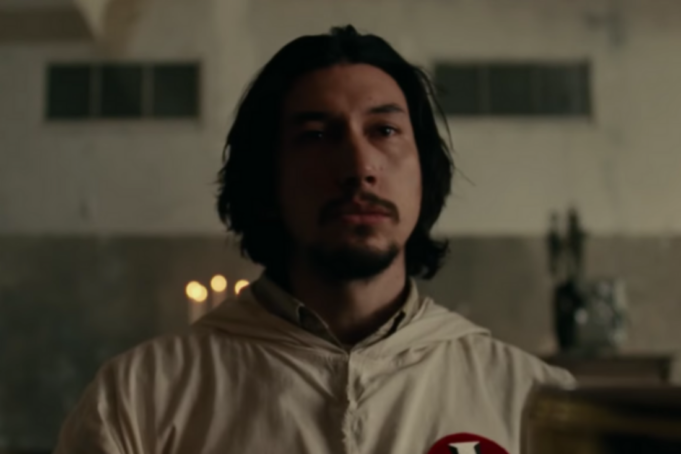My last post in this irregular series was about an actor who is possibly too reticent for her own good in supporting roles. That’s not a problem that Adam Driver has had. The 34-year-old native of San Diego has done something distinctive in almost every project he’s been a part of (including BlacKkKlansman, which opened this past weekend), and he’s helped break a mold when it comes to actors and the military.
Actors and the military have overlapped since the beginning of Hollywood. In bygone wars, even A-list stars either signed up or were drafted. Clark Gable and Jimmy Stewart served with distinction in World War II, while John Wayne weaseled out of military commitments in ways that make for unedifying reading. George C. Scott was born too late for that war, but served in the Marines immediately afterwards before his sharp features and knowledge of the milieu made for great performances in Dr. Strangelove and Patton. When we think of soldiers who become actors, we’re likely to think of the late R. Lee Ermey, the Marine drill sergeant who portrayed a Marine drill sergeant to unforgettable effect in Full Metal Jacket, leading to a distinguished career playing cops, politicians, and other authority figures. Even in his civilian roles (like his grieving father in Dead Man Walking), Ermey’s bearing infused his characters with a certain rectitude.
As you may know, Driver enlisted in the U.S. Marines shortly after the 9/11 terrorist attacks. He was never deployed, but he served two years and eight months before a biking accident led to a medical discharge. (Funny fact: His fellow Marines called him “Ears Two,” since there was already another soldier in their ranks with big ears whom they nicknamed “Ears One.”) Following his stint in the Corps, he got into Juilliard, which he had previously auditioned for before enlisting. He has described the difficulties he faced in transitioning from the Corps to an environment like the theater, with such a radically different structure.
You might think that, with the professionalization of our nation’s military, soldiers-turned-actors would be even more in the R. Lee Ermey mold. That hasn’t happened. Instead of playing cops and soldiers in his acting career, Driver is instead playing long-haired hipsters and artistes. He graduated from Juilliard in 2009 and, no surprise, started out based in New York, with guest gigs on the Law & Order shows and playing a casual hookup of Greta Gerwig’s in Frances Ha. He brought that same louche sexuality to the TV show that gave him his big break, as the eponymous Adam in Lena Dunham’s Girls.
He doesn’t carry himself like a soldier, perhaps because he isn’t built like one. He’s tall, but on the scrawny side. His physique and his off-the-beat line readings have made him attractive to comedy filmmakers. In What If, his character has just had sex and is now making himself a plate of nachos, and his burst of exuberance over the combination of sex and nachos makes Daniel Radcliffe jump out of his seat. That unruliness also makes him pop off the screen in the otherwise dreary domestic dramedy This Is Where I Leave You, while his Southern drawl has a cooling effect as a fatalistic amputee war veteran in Logan Lucky. Driver knows how to make his intensity shade over into obnoxiousness (that smile of his becomes a self-satisfied smirk), as in While We’re Young, where his aspiring filmmaker turns out to be cozying up to Ben Stiller only to use him for his connection to a famous documentarian. Yet he can go the other way and portray a kind and sensitive man in Paterson, where he portrays a poetry-writing bus driver. He was also in Inside Llewyn Davis, where he did this:
It’s weird that it took until Star Wars: The Force Awakens for someone to use his physical qualities. Anyone who didn’t know about Driver’s military background would have been surprised to see him swinging a lightsaber with such assurance, but that’s a result of the actor not playing up that aspect of his life in the press. (Though he hasn’t shied away from it, either.) In the celebrated throne-room fight in Star Wars: The Last Jedi, Kylo Ren gets disarmed but is still able to fight off Snoke’s last guard barehanded before Rey throws him her saber for a superb finishing stroke.
Driver doesn’t have limitless range as an actor: In Silence, the period setting and the role of a martyred priest seems to dampen down everything that makes him distinctive. Still, in BlacKkKlansman he’s the most interesting guy on the screen as the white cop who’s taking most of the heat because he’s the one impersonating Ron Stallworth in the Klan meetings while having to hide not only his badge but also his Jewishness from the Klansmen. In a soft-pedaled way, he captures the courage of this undercover operative who smoothly talks the talk when he’s with the racists, then gets home and thinks about his own Jewish identity for the first time in his life.
Offscreen, Driver is the founder of Arts in the Armed Forces, a nonprofit organization that brings theater to our military servicemen and women. We haven’t yet seen a woman with a military background become an acting star, but when that happens, it will be fascinating to watch play out, and perhaps we’ll owe that as well to Driver. For now, we’ve got an actor who has managed to bring his background to bear on some sterling performances on our screens.
Also in the Considering series:
Toni Collette
Kevin Spacey
Ellen Page
Kate Beckinsale
Amanda Seyfried
Taraji P. Henson
Chuck Jones
Song Kang-ho
Keira Knightley
Park Chan-wook
Matthew McConaughey
Bruce Willis
Anna Faris
Kenneth Branagh













While John Wayne most definitely did weasle out of WW II, Gary Cooper did not. Cooper enlisted in the army soon after Pearl Harbor. He was rejected on medical grounds — the result of a severe hip injury suffered in an automobile accident when a ten-ager, coupled with injuries from his year as a stunt man. He was also forty years old. Cooper rejected the slew of war films offered him (except for The Story of Dr. Wassell, only because it dealt with an extraordinary evacuation) during the war because of his guilt at not serving while so many were. When Cooper told Ernest Hemingway about his guilt at not having served, Hemingway told him never feel guilty about missing war, Coop. Cooper’s older brother, who served in WW I, told him the same thing.